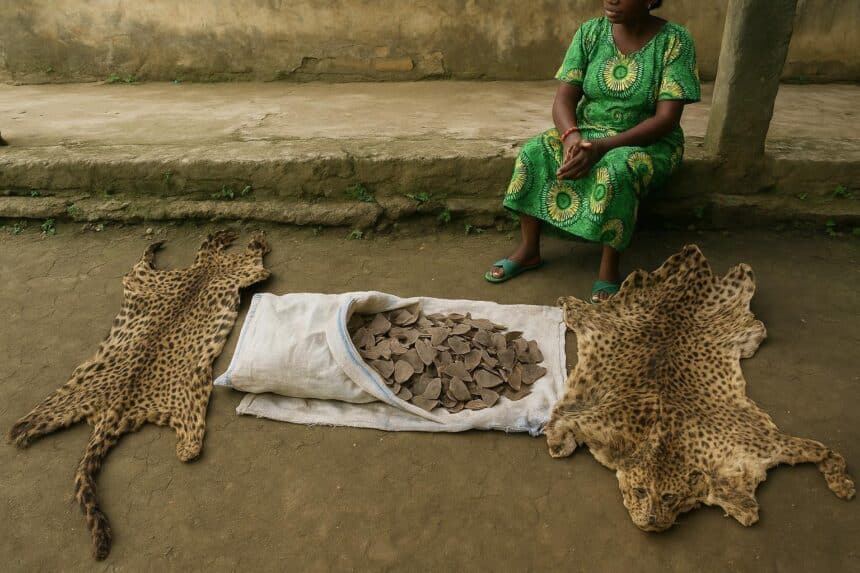Twin wildlife trials set for October
Two high-profile wildlife trafficking cases will dominate courtrooms in northern Congo this week, underscoring the Republic’s determination to safeguard iconic species such as elephants, panthers and pangolins. Observers from conservation groups are expected to attend, and local residents are already debating the reach of the 2008 wildlife law.
On 15 October the Tribunal de Grande Instance of Owando, Cuvette department, will examine the first file. Less than 24 hours later, the bench in Impfondo, Likouala, will hear a second case. Both defendants face charges of possession, transport and attempted sale of protected trophies.
Authorities emphasize that the hearings are open to the public, a decision meant to reinforce transparency and to remind would-be traffickers that rural courts now move as swiftly as those in Brazzaville. Journalists and radio stations have already booked seats.
Owando ivory suspect faces justice
The Owando file traces back to 29 November 2024, when gendarmes stopped a motorcycle at sunset on the outskirts of the town. Hidden inside a rice sack they found three polished ivory tips, equivalent to two young forest elephants allegedly killed near Etoumbi in Cuvette-Ouest.
Investigators from the Ministry of Forest Economy say the suspect, a 34-year-old farmer, had stored the tusks in a relative’s house for weeks while searching for a buyer capable of paying up to three million francs CFA. He was arrested without resistance.
Colonel Jean-Marc Mbon, head of the regional gendarmerie, told our reporter that the operation benefited from tips offered by local hunters worried about poaching pressure. “People understood they lose more than they gain when elephants vanish,” he noted, praising village vigilance committees.
Impfondo seizure of panther and pangolin
The second hearing on 16 October concerns a 29-year-old trader arrested on 25 August 2025 after disembarking from a river pirogue at the Oubangui wharf in Impfondo. Officers seized two panther skins, several bags of pangolin scales and a pouch filled with giant pangolin claws.
Prosecutors allege the goods were destined for Kinshasa via informal border crossings, where pangolin derivatives can fetch prices ten times higher than in northern Congo. The accused insists she only acted as a courier paid to carry a locked suitcase. Investigators contest that claim.
Likouala Forest Directorate chief Rosalie Ibovi says pangolins, sometimes called “scaly anteaters”, are now the world’s most trafficked mammals. “This case illustrates the shift from urban to river routes,” she explained, urging boat owners to demand proper cargo documents before granting passage.
Law 37-2008 and possible penalties
Both defendants are prosecuted under Law 37-2008 on Wildlife and Protected Areas, which places elephants, panthers and pangolins in the fully protected category. Article 27 forbids possession, import or export of their trophies without a special scientific exemption from the Ministry of Forest Economy.
The statute sets maximum penalties of five years in prison and fines up to five million CFA francs, roughly 7,600 euros. Lawyers say recent judgments show magistrates increasingly choose mid-range sentences coupled with confiscation of vehicles and hunting weapons to deter networks.
Conservation analysts interviewed cite Congo-Brazzaville’s collaboration with the Wildlife Crime Initiative and PALF as a regional model. By mixing community awareness, targeted patrols and swift prosecution, the country has foiled multiple ivory shipments since 2022, including four cases in Sangha last year.
Local engagement boosts conservation
Local leaders in Cuvette and Likouala regularly host radio forums on bushmeat alternatives, stressing that biodiversity also supports fishing and eco-tourism jobs. Several markets now stock farmed chicken funded by micro-credits issued through the National Employment Fund and local cooperatives.
Youth group Ekolo Ya Biso recently staged street theatre in Owando’s bus station, depicting the journey of an orphaned elephant calf. Passers-by shared the performance on TikTok, generating thousands of views and prompting online pledges to report poachers to the nearest ranger post.
For PALF coordinator Aristide Nlandu, collaboration has shifted attitudes. “A few years ago people feared speaking against traffickers; now they pick up the phone,” he said, crediting mobile-money rewards funded by international donors for actionable tips worth up to 50,000 CFA per alert.
Timeline and outcomes to follow
The Owando court will begin with the reading of charges on Wednesday morning before hearing witness statements from arresting officers and two hunters. A verdict could come the same day, although sentencing may be adjourned to allow social inquiries into the defendant’s background.
In Impfondo, judicial sources anticipate a longer debate because customs officials from the border post want to testify. Regardless of the exact timelines, both rulings will send a message that Congo-Brazzaville’s fight against wildlife crime now stretches from the capital deep into the forest heartland.
Observers from regional media will relay the outcomes live on community radio, allowing villagers without internet to follow proceedings. Should convictions be secured, seized trophies will be transferred to the national ivory stockpile in Brazzaville pending scientific cataloguing.






















